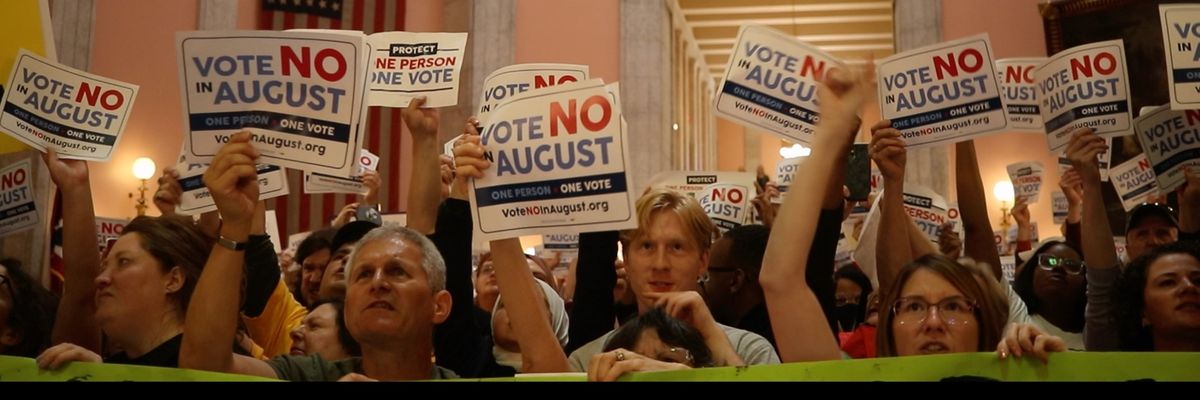Over the past few years, states across the country have passed laws that make voting more difficult and elections more vulnerable to partisan interference, and 2023 is no exception. But it is critical to remember that there is also flourishing pro-democracy movement that has pushed many states to make important strides in the opposite direction.
This past year, at least 24 states enacted over 50 laws that protect the freedom to vote, prevent attacks on the electoral process, crack down on gerrymandering, or strengthen campaign finance safeguards as of December 1, 2023. Yet state lawmakers cannot safeguard democracy on their own. Robust federal legislation is needed to ensure that democracy is protected across the country and that every voter has equal access to the ballot.
Among the most notable advances in 2023 was Minnesota’s passage of a transformative package of pro-voter reforms. Among them is automatic voter registration, bringing the total number of states with automatic voter registration to 23 plus the District of Columbia. This means that when eligible Minnesota residents interact with certain state agencies—including when applying for a driver’s license or state health insurance—they will automatically be registered to vote unless they choose to opt out. The legislation also allows 16- and 17-year-olds to pre-register to vote, enacts new protections for election workers, and creates a permanent absentee voter list.
While state reforms are critical, they are not a substitute for federal legislation that would set baseline national standards to protect the freedom to vote and make other critical changes.
Minnesota lawmakers also passed legislation this year that restores voting rights for people convicted of a felony, instantly re-enfranchising over 50,000 Minnesotans on parole, probation, or community release—and countless more in the future.
Another closely divided Midwestern state, Michigan, made important advances. This year, lawmakers passed a package of legislation to implement Proposal 2, a pro-voter constitutional amendment that was approved by Michigan voters in 2022 with nearly 60% of the vote. (Proposal 2 is one of several pro-democracy amendments that Michigan voters approved with overwhelming margins in the past few years.)
Michigan voters now have nine days of early voting, improved absentee ballot options, a higher number of ballot drop boxes, and an expanded list of acceptable voter IDs. This reform will benefit the many voters who prefer to vote by mail, a trend that exploded in popularity during the pandemic and remains highly popular in the state.
Additionally, Michigan lawmakers passed legislation this year protecting election officials from harassment and another that automatically registers individuals to vote upon release from incarceration—the first state to offer such an immediate and automatic restoration of voting rights.
In New Mexico, the legislature passed a wide-ranging bill that restores voting rights to individuals with a felony conviction, establishes automatic voter registration, and added voting rights protections for Native Americans. It also made it so voters who want to vote by mail only have to opt-in once.
The Nevada legislature passed a series of pro-voter laws this year that were signed by the state’s Republican governor: one that improves ballot access for eligible incarcerated voters by requiring jails to better provide voting materials, another that standardizes the design of mail-in ballot return envelopes and clarifies electioneering rules, and one that make it easier to vote on Native American reservations.
In another notable development, Connecticut became the sixth state to establish a state-level Voting Rights Act. In recent years, states have passed their own versions of the Voting Rights Act to protect voting access for historically disenfranchised groups. This trend is in response to two Supreme Court rulings that gutted the federal Voting Rights Act of 1965.
2023 also saw several states enact significant new campaign finance reforms. Minnesota improved campaign finance safeguards to boost transparency and deter foreign influence in elections. Almost 90% of Maine voters adopted new safeguards to prevent foreign governments and corporations from interfering in the state’s elections. And New York State’s groundbreaking small donor matching system went into effect, and over 150 candidates have already signed up to participate.
Important voting reforms are not exclusive to blue states, with many pro-democracy bills also passing in red and purple states this year. For example, Oklahoma codified protections for election officials, and Louisiana and Utah improved voting access for voters with disabilities. The divided Virginia legislature voted to ease absentee ballot requirements, a measure that was signed into law by a Republican governor. Lastly, an important win for direct democracy took place in Ohio, where 57% of voters rejected a proposal that would have increased the threshold required to pass citizen-initiated constitutional amendments from 50% to 60%.
This state-level progress is a reflection of a basic reality documented in poll after poll: Voters want meaningful reforms to democracy. And in 24 states this year, elected officials have responded, passing critical reforms that will improve the state of democracy for many Americans.
Ultimately though, while state reforms are critical, they are not a substitute for federal legislation that would set baseline national standards to protect the freedom to vote and make other critical changes. Access to the ballot box, secure election systems, fair district maps, and strong campaign finance laws are the basic safeguards needed to ensure we have a democracy that works for all Americans, regardless of where they live.
